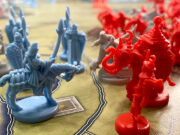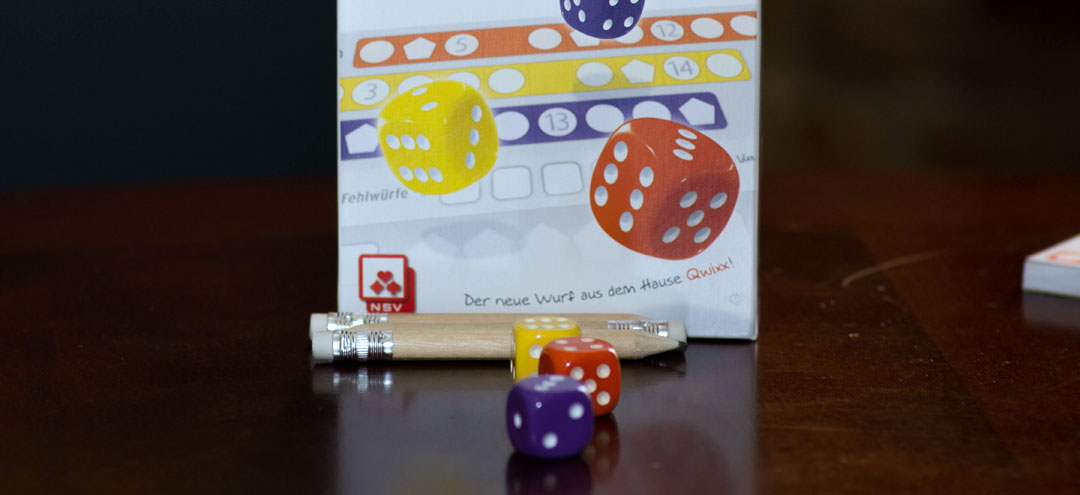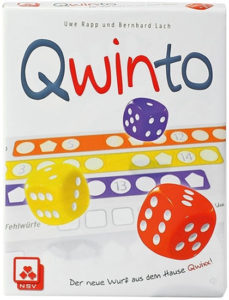 Today we are looking at another game from the roll-and-write genre, similar to the recently reviewed Twenty One and award winning Qwixx. Also published by NSV – Qwinto follows a tried-and-true formula but adds a few new elements.
Today we are looking at another game from the roll-and-write genre, similar to the recently reviewed Twenty One and award winning Qwixx. Also published by NSV – Qwinto follows a tried-and-true formula but adds a few new elements.
Qwinto plays 2-6 players and plays in about 15 minutes.
Game Overview:
In Qwinto, each player will attempt to complete as many numbers as possible on their score sheet to score points. There are three different colored rows and a die in each of those three colors. Depending on what die (or dice) is rolled limits the row that you can write the result into, but your results have to ascend from left to right and you can’t use a duplicate number in a row or column.
The game ends when a player has completed two rows or a player has rolled four failures and then the player with the most points wins.
Game Components:
Qwinto comes with three dice, a scorepad, and four mini-pencils (although the game players up to six players). Pretty standard for roll and write games. The scorepads are single sided, and if you do run out you’ll find yourself needing to get a new copy of the game.
How To Play:

On your turn, you can choose which dice to roll. After rolling, you can keep the result or reroll all of the dice you rolled the first time. Then you take the total and write that sum in any open space in a corresponding color. For example, if you choose to roll the purple and orange die and the total is 8, you can write an 8 in the purple or orange row. You can’t, however, take that result in the yellow row.
You do have to follow some simple requirements when taking a result. The row must ascend from left to right and you can’t use the same number multiple times in a row or column. The column restriction is easily overlooked though, and you may have to remind your fellow dice-rolling buddies throughout the game.
All players can take the result and write it on their sheet, but only the player who rolled the dice is required to. If they cannot, they must mark a failure that will earn -5 points at the end of the game. When a player has recorded a fourth failure, or a player completely fills out two rows, the game is over.
Players score points based on the results they have recorded on their sheet. If a row is completed filled out, they score points for the row equal to whatever result is in the last space. If a row is only partially complete, you score 1 point for each space you have a number written in, regardless of what that number is.
There are also five columns that have a value in each row, and one of those spaces on the scoresheet is a pentagon rather than a circle. If you have a number in each of the three spaces in that column, you score points equal to whatever number is in the pentagonal space.
Players subtract any points from failures and whoever has the most points is the winner.
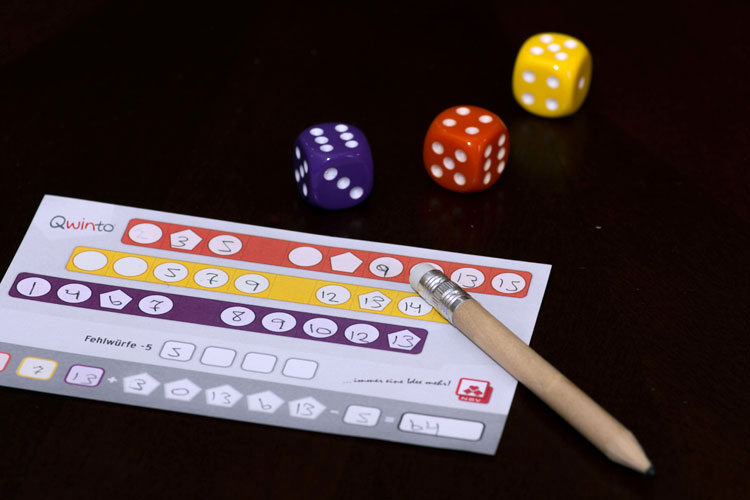
Game Experience:
So if you’ve read my Twenty One review, you know I like roll-and-write games, and Qwinto may be my favorite. It is probably the easiest to explain and yet has the most interesting decisions to make throughout the game.
Because you can’t repeat a value in a given column, it becomes a really difficult decision on exactly how to best take the results that are available to you in a game of Qwinto. In theory you want every row to have a number around 7-9 in the middle, but you can’t always make that happen. You can lock yourself out of ever completing a space if you aren’t careful.
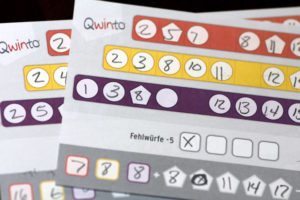
You have to really focus on maximizing the values in the pentagon spaces as well, as they can score you a ton of points. There is a lot to keep in mind for a game with rules that can be explained in about 2 minutes.
The added decision of which dice to roll adds another small layer of strategy. Rolling three dice a lot seems like a pretty good idea as you can then write the result in any row. However, everyone gets that same flexibility so it’s more likely you are also helping other players. And of course, at some point, you are going to want lower values than you often get with three dice.
Final Thoughts:
Qwinto offers a lot of depth without a lot of complexity. It plays well at all player counts but still only takes about 15 minutes. There really isn’t much to complain about. If you don’t like roll-and-write games, it’s unlikely that Qwinto is going to change your mind.
But if you are a fan of Qwixx and want something that has a bit more depth, I would wholeheartedly recommend Qwinto.
If you’d like to get a copy of Qwinto, you can pick it up for about $12.
Final Score: 4.5 Stars – A great roll-and-write game with plenty of depth.
 Hits:
Hits:
• Incredibly simple rules, can explain in 5 minutes
• More depth than similar games, a lot to consider on every roll
• Comes with pencils!
Misses:
• If you hate roll-and-writes, it’s a roll-and-write.




